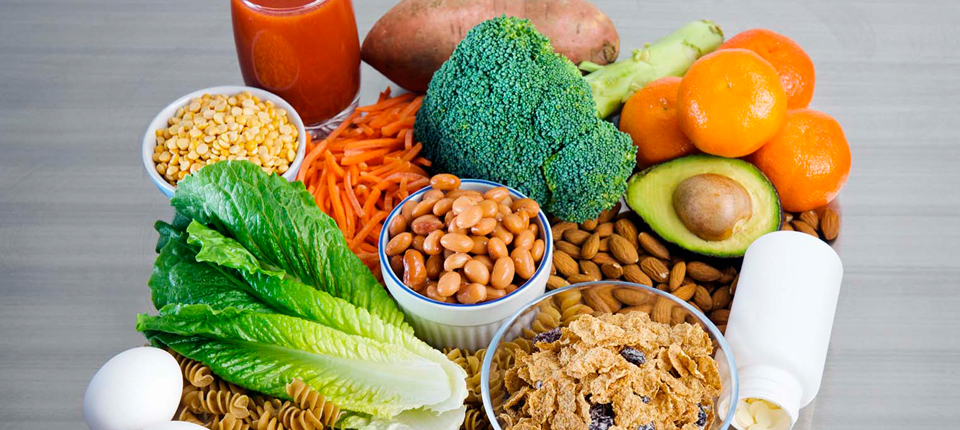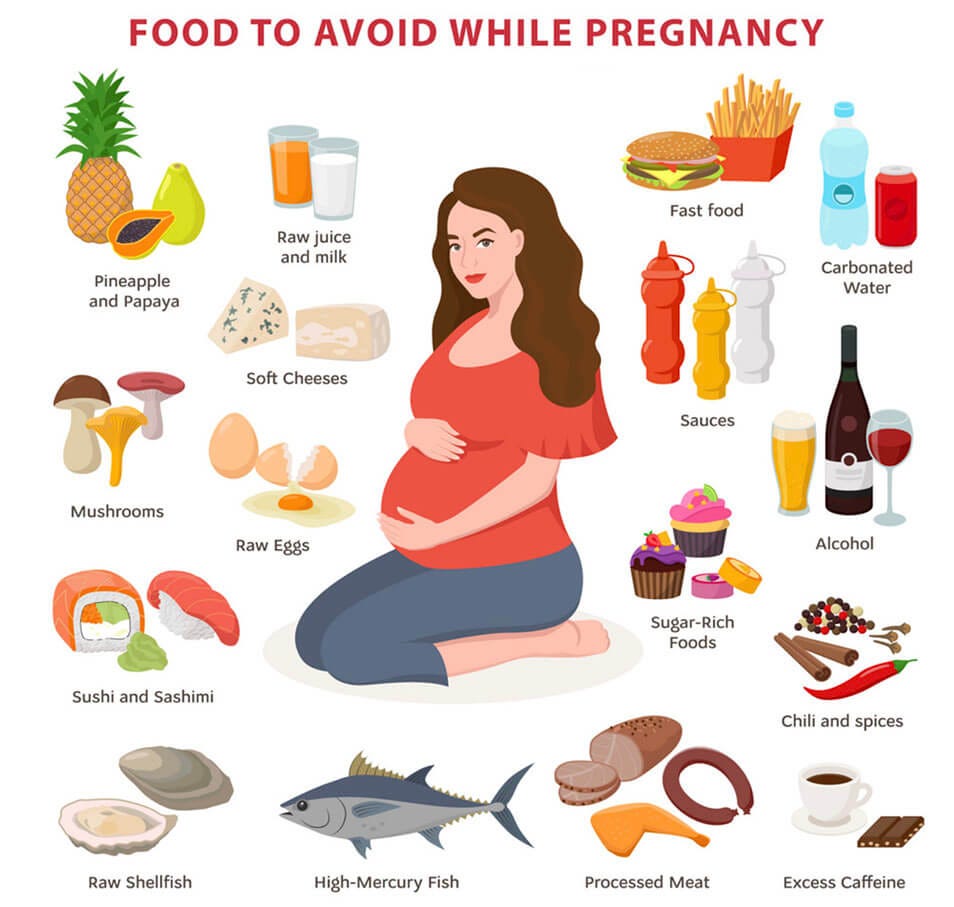Pregnancy food list and regular exercise are essential for maintaining a healthy pregnancy. Taking care of your diet and engaging in regular physical activity are crucial aspects of a healthy pregnancy.
By following a pregnancy food list, you can ensure that you are getting the necessary nutrients that promote your baby’s growth and development. Additionally, regular exercise helps to maintain a healthy weight, increase energy levels, strengthen muscles, and prepare your body for childbirth.
It is important to consult with your healthcare provider to create a personalized plan that suits your individual needs. We will explore the various foods that are beneficial during pregnancy and provide insights into safe and effective exercise routines for expecting mothers.
Importance Of Nourishing Your Body During Pregnancy
During pregnancy, the importance of nourishing your body cannot be overstated. The food you consume and the exercise you engage in play a vital role in the health and well-being of both you and your baby. Proper nutrition and regular exercise can help ensure a healthy pregnancy, reduce the risk of complications, and promote optimal fetal development.
Nutritional Needs During Pregnancy
Meeting your dietary requirements is crucial during pregnancy. Your body needs a variety of essential nutrients to support the growth and development of your baby. By following a well-balanced diet, you can provide your body with the necessary nourishment it needs.
Here are some key nutrients that pregnant women should include in their diet:
- Protein: Helps in the development of baby’s tissues and organs.
- Calcium: Essential for strong bones and teeth.
- Iron: Important for the production of red blood cells and the prevention of anemia.
- Folic Acid: Vital for the formation of the baby’s neural tube and reducing the risk of birth defects.
- Omega-3 Fatty Acids: Support brain and eye development.
- Vitamin D: Essential for the absorption of calcium and proper bone growth.
Benefits Of A Well-nourished Body
A well-nourished body provides numerous benefits, not only for you but also for your growing baby. Here are some of the advantages:
1. Healthy Pregnancy:
When you nourish your body with a balanced diet, you promote a healthy pregnancy. Proper nutrition helps support your baby’s development, reduce the risk of birth defects, and minimize the chances of complications during pregnancy.
2. Optimal Fetal Development:
By consuming a variety of nutrients, you optimize your baby’s growth and development. Key nutrients like folic acid, iron, and omega-3 fatty acids are crucial for the formation of the baby’s organs, brain, and nervous system.
3. Increased Energy Levels:
Proper nutrition fuels your body with the energy it needs to support you and your baby. Eating a balanced diet can help combat fatigue and keep you energized throughout the day.
4. Faster Recovery:
By nourishing your body during pregnancy, you are setting yourself up for a smoother postpartum recovery. A well-nourished body has better reserves to heal and replenish after childbirth.
Ensuring A Healthy Pregnancy Through Proper Nutrition And Exercise
Both proper nutrition and regular exercise are essential in ensuring a healthy pregnancy. Combining these two aspects maximizes the benefits for both you and your baby.
When it comes to exercise during pregnancy, it is crucial to consult with your healthcare provider to determine what exercises are safe and suitable for your specific condition. Regular physical activity can help improve circulation, manage weight gain, relieve pregnancy discomfort, and promote overall well-being.
By focusing on nourishing your body with a well-balanced diet and engaging in appropriate exercise, you are taking proactive steps to ensure a healthy pregnancy. Remember to listen to your body, make modifications as needed, and seek professional guidance throughout your journey.
Essential Nutrients For A Healthy Pregnancy

Pregnancy is a crucial time when a woman’s body undergoes numerous physiological changes to nurture and support the growing baby. To ensure a healthy pregnancy, it is essential to pay close attention to the nutrients consumed during this period. A balanced diet consisting of macronutrients and micronutrients is crucial for optimal development and the well-being of both the mother and the baby. Let’s take a closer look at the essential nutrients that pregnant women should incorporate into their diet.
Macronutrients For Optimal Development
Macronutrients, such as carbohydrates, proteins, and fats, play a vital role in supporting the growth and development of the baby. Here’s a breakdown of each macronutrient:
- Carbohydrates: Carbohydrates are the body’s primary source of energy, and during pregnancy, they become even more important. Opt for complex carbohydrates like whole grains, fruits, and vegetables, as they provide a steady release of energy and are rich in fiber, aiding digestion.
- Proteins: Proteins are the building blocks of cells and are essential for the growth and development of the baby’s organs, muscles, and tissues. Include lean meats, fish, eggs, dairy products, legumes, and nuts in your diet to ensure an adequate protein intake.
- Fats: Healthy fats are crucial for the development of the baby’s brain and other organs. Include sources of unsaturated fats like avocados, nuts, seeds, and olive oil in your diet. Avoid trans fats and limit your intake of saturated fats.
Micronutrients For A Healthy Pregnancy
While macronutrients provide the necessary energy and building blocks, micronutrients are equally important as they facilitate various essential functions in the body. Here are some key micronutrients you should focus on:
- Folic Acid: Folic acid is vital for the early development of the baby’s neural tube, which eventually forms the brain and spinal cord. Include leafy green vegetables, citrus fruits, and fortified cereals in your diet to ensure sufficient folic acid intake.
- Iron: Iron is necessary for the production of red blood cells, as it carries oxygen to the baby and prevents anemia in the mother. Incorporate iron-rich foods like lean meats, spinach, beans, and fortified cereals in your diet.
- Calcium: Calcium is crucial for the development of the baby’s bones and teeth. Ensure you consume adequate amounts of dairy products, leafy greens, and fish with soft bones to meet your calcium needs.
- Omega-3 Fatty Acids: Omega-3 fatty acids aid in the baby’s brain and eye development. Include sources such as salmon, chia seeds, and walnuts in your diet to ensure a healthy intake of these essential fatty acids.
Importance Of A Balanced Diet During Pregnancy
A balanced diet during pregnancy is essential to provide the necessary nutrients for the proper growth and development of the baby, as well as to maintain the overall health of the mother. It ensures that both the baby and the mother receive the essential vitamins, minerals, and nutrients required for a healthy pregnancy.
By consuming a varied and balanced diet, pregnant women can minimize the risk of nutritional deficiencies and potential pregnancy complications. Additionally, a balanced diet helps maintain a healthy weight, reduces the risk of gestational diabetes, and assists in postpartum recovery. Therefore, it is crucial to focus on consuming a diverse range of nutrient-rich foods, adhering to the recommendations provided by a healthcare professional.
Pregnancy Superfoods For Nourishment

Pregnancy is a crucial time to focus on nourishing your body and your growing baby. A well-balanced diet, rich in essential nutrients, is essential for both you and your baby’s health. Incorporating pregnancy superfoods into your daily meals can provide the necessary vitamins, minerals, and proteins needed for optimal fetal development. Here are some key food groups you should consider including in your diet during pregnancy: fruits and vegetables, protein-rich foods, and healthy fats.
Incorporating Fruits And Vegetables Into Your Diet
Fruits and vegetables are a vital part of a healthy pregnancy diet. Packed with vitamins, minerals, and fiber, they can help promote proper digestion, support your immune system, and prevent constipation. Aim to include a variety of colorful fruits and vegetables in your meals to ensure you are consuming a diverse range of nutrients. Here are some examples of pregnancy superfoods in this category:
- Leafy greens such as spinach, kale, and Swiss chard
- Citrus fruits like oranges, grapefruits, and lemons
- Berries such as blueberries, strawberries, and raspberries
- Avocados, which are rich in healthy fats and fiber
- Cruciferous vegetables like broccoli and cauliflower
Protein-rich Foods For Fetal Growth And Development
Proteins play a crucial role in fetal growth and development, as they are the building blocks of cells and tissues. Including protein-rich foods in your pregnancy diet can help support healthy fetal development. Some excellent sources of protein include:
- Lean meats like chicken, turkey, and beef
- Fish, especially fatty fish like salmon and sardines, which are high in omega-3 fatty acids
- Legumes such as lentils, chickpeas, and black beans
- Tofu and other soy products
- Eggs, which are also a good source of essential vitamins and minerals
Healthy Fats For Brain Development
Healthy fats are vital for the development of your baby’s brain and nervous system. Including these fats in your diet can also help provide you with energy and support hormonal balance. Some pregnancy superfoods rich in healthy fats include:
- Nuts and seeds, such as almonds, walnuts, chia seeds, and flaxseeds
- Avocados, which are also a good source of fiber and vitamins
- Olive oil and coconut oil for cooking and dressings
- Fatty fish like salmon, mackerel, and trout
- Full-fat dairy products like whole milk and Greek yogurt
Incorporating these pregnancy superfoods into your diet can help ensure you and your baby are getting the necessary nutrients for a healthy pregnancy. Remember to consult with your healthcare provider for personalized advice and recommendations based on your specific needs and dietary restrictions.
Foods To Avoid During Pregnancy

During pregnancy, it is important to avoid certain foods that may pose a risk to both the mother and the baby’s health. These include raw or undercooked meat, fish high in mercury, unpasteurized dairy products, and certain types of cheese.
Regular exercise is also crucial for maintaining a healthy pregnancy and reducing the risk of complications.
Harmful Foods That Should Be Avoided
During pregnancy, it is crucial to pay attention to your diet and avoid certain foods that can pose potential risks and complications. While it is important to focus on eating a well-balanced and nutritious diet, there are specific foods that should be completely avoided to ensure the health and well-being of both the mother and the baby.
Potential Risks And Complications Associated With Certain Foods
Eating the wrong kind of foods during pregnancy can lead to various risks and complications, which can have serious implications on the development of the baby. Some of the potential risks associated with certain foods include:
- Foodborne illnesses: Certain foods are more susceptible to bacteria, such as salmonella or listeria, which can cause foodborne illnesses. Pregnant women are more vulnerable to these infections, which can lead to severe complications.
- Low birth weight: Consuming foods that are high in mercury, such as certain types of fish, can increase the risk of low birth weight. Mercury can affect the nervous system development of the baby.
- Allergies and intolerances: Foods that commonly cause allergies or intolerances, such as peanuts, shellfish, or dairy products, should be avoided during pregnancy to reduce the risk of allergic reactions in the baby.
- Hormonal imbalances: Some foods, such as soy-based products or excessive caffeine, can interfere with hormonal balances during pregnancy, potentially affecting the baby’s growth and development.
Making Informed Choices For A Safe And Healthy Pregnancy
To ensure a safe and healthy pregnancy, it is vital to make informed choices about the foods you consume. By avoiding the following foods, you can reduce the potential risks and complications associated with pregnancy:
| Foods to Avoid | Reasons to Avoid |
|---|---|
| Raw or undercooked meat, poultry, and seafood | May contain harmful bacteria or parasites that can cause foodborne illnesses |
| Unpasteurized dairy products and soft cheeses | Potential risk of listeria infection, which can lead to miscarriage or stillbirth |
| Raw eggs or foods with raw eggs | Higher risk of salmonella infection |
| High-mercury fish | May lead to developmental issues and affect the baby’s nervous system |
| Unwashed fruits and vegetables | Potential exposure to harmful bacteria or parasites |
| Caffeine and alcohol | Can interfere with the baby’s growth and development |
By being mindful of your diet and avoiding these harmful foods during pregnancy, you can ensure a safe and healthy journey for both you and your baby. Remember to consult with your healthcare provider for personalized recommendations and further guidance regarding your specific dietary needs.
Planning Your Pregnancy Exercise Routine

Planning Your Pregnancy Exercise Routine is crucial for a healthy pregnancy. Along with maintaining a pregnancy food list, regular exercise during pregnancy promotes overall well-being and prepares your body for labor and delivery. Find the right exercises that are safe and beneficial under the guidance of your healthcare provider.
Safe And Effective Exercises During Pregnancy
Planning your pregnancy exercise routine is an essential part of ensuring a healthy and comfortable pregnancy. Regular physical activity during pregnancy has numerous benefits for both moms-to-be and their growing babies. However, it is important to note that not all exercises are safe or suitable for expectant mothers. It’s essential to choose exercises that are safe and effective for pregnant women.
Benefits Of Regular Physical Activity For Expecting Mothers
Engaging in regular physical activity during pregnancy can provide numerous benefits for expecting mothers. These benefits include:
- Promoting healthy weight gain:
Regular exercise helps pregnant women maintain a healthy weight, preventing excessive weight gain during pregnancy.
- Improving mood and mental health:
Physical activity releases endorphins, also known as the ‘feel-good’ hormones, helping to reduce stress and improve mood during pregnancy.
- Boosting energy levels:
Staying active can help combat fatigue commonly experienced during pregnancy, leaving you feeling more energized throughout the day.
- Reducing pregnancy discomfort:
Exercise can alleviate common pregnancy discomforts such as backaches, constipation, and swelling by improving overall muscle tone and flexibility.
- Promoting better sleep:
Regular physical activity can help improve your sleep quality, making it easier for pregnant women to get the rest they need.
Incorporating Exercise Into Your Daily Routine
When it comes to incorporating exercise into your daily routine, it’s important to choose activities that you enjoy and are comfortable with. This will make it easier to stick to your exercise routine. Here are a few tips to help you get started:
- Consult with your healthcare provider:
Prior to beginning any exercise routine, consult with your healthcare provider to determine which exercises are safe for you and your baby.
- Start slow and gradually increase intensity:
Begin with low-impact exercises and gradually increase the intensity and duration as your pregnancy progresses.
- Stay hydrated:
Drink plenty of water before, during, and after your exercise sessions to stay hydrated.
- Warm-up and cool down:
Always include a warm-up and cool down session to prepare your body for exercise and help prevent muscle soreness.
- Modify exercises as needed:
As your baby bump grows, you may need to modify certain exercises to accommodate your changing body. Listen to your body and make adjustments as necessary.
- Choose pregnancy-friendly activities:
Opt for low-impact exercises such as walking, swimming, prenatal yoga, and stationary biking, which are generally safe and effective for expecting mothers.
By following these guidelines, you can create a pregnancy exercise routine that is safe, effective, and enjoyable. Remember to always listen to your body and consult with your healthcare provider before starting or modifying any exercise program during pregnancy.
Specific Exercises For Each Trimester

Staying active during pregnancy is vital for overall health and well-being. Engaging in regular exercise can help manage weight gain, improve mood, boost energy levels, and reduce pregnancy discomfort. However, it is important to remember that not all exercises are suitable for each trimester of pregnancy. As your body changes and your baby grows, certain exercises become more appropriate. In this blog post, we will explore specific exercises for each trimester, ensuring you can maintain fitness and prepare your body for childbirth.
First Trimester Exercises For Maintaining Fitness
During the first trimester, you may still engage in most exercises that you enjoyed prior to pregnancy. However, it is crucial to listen to your body and make any necessary modifications. Here are some exercises that can help you maintain fitness during the first trimester:
1. Walking: Walking is a low-impact exercise that is gentle on your joints and can be done at your own pace. It is a great way to stay active and increase cardiovascular endurance.
2. Prenatal Yoga: Prenatal yoga focuses on gentle stretching, breathing techniques, and improving flexibility. It helps to alleviate pregnancy-related aches and pains.
3. Swimming: Swimming is a fantastic option during the first trimester as it provides a full-body workout without putting strain on your joints. It is a low-impact exercise that helps alleviate swelling and improves circulation.
Second Trimester Exercises For Strength And Flexibility
As your belly grows and your center of gravity shifts during the second trimester, it is important to focus on exercises that promote strength and flexibility. Here are some exercises that can be beneficial during this trimester:
1. Prenatal Pilates: Prenatal Pilates focuses on core strength, posture, and stability. It helps alleviate back pain and improves overall body strength.
2. Prenatal Strength Training: Incorporating light weights into your exercise routine can help maintain muscle tone and strength. However, it is important to use proper form and avoid excessive strain.
3. Prenatal Stretching: Engaging in regular stretching exercises can help improve flexibility, reduce muscle tension, and prevent cramping. It is important to focus on gentle stretches that target the entire body.
Third Trimester Exercises For Preparing The Body For Childbirth
The third trimester is a crucial time to focus on exercises that prepare your body for childbirth. These exercises help strengthen the muscles needed for labor and delivery. Here are some exercises for the third trimester:
1. Kegel Exercises: Kegels help strengthen the pelvic floor muscles, which play a vital role in labor and postpartum recovery. They can be done anytime, anywhere, and are particularly beneficial during the third trimester.
2. Squats: Squats help open the pelvis and strengthen the lower body, which can aid in the pushing phase of labor. It is important to use proper form and listen to your body’s limits.
3. Pelvic Tilts: Pelvic tilts help relieve lower back pain and improve pelvic mobility. They also strengthen the abdominal muscles and prepare them for pushing during labor.
Incorporating these specific exercises into each trimester of your pregnancy can help maintain fitness, improve strength and flexibility, and prepare your body for the incredible journey of childbirth. Remember to consult your healthcare provider before starting any exercise routine and listen to your body throughout your pregnancy.
Staying Active At Home: Tips And Tricks

Maintaining an active lifestyle during pregnancy is essential for the well-being of both mother and baby. Discover a variety of safe exercises and a nutrition-packed food list to stay healthy and fit while enjoying the comfort of home.
Creating A Workout Space At Home
During pregnancy, it’s essential to incorporate regular exercise into your routine to promote a healthy pregnancy and prepare your body for childbirth. Staying active at home allows you to maintain a consistent exercise schedule while avoiding the inconvenience of going to a gym or attending a fitness class. To achieve this, it’s important to create a dedicated workout space in your home.
First, find a quiet and well-ventilated area where you can comfortably move around without any obstructions. Clear the space of any potential hazards and ensure there is enough room for various exercise movements. Consider using a yoga mat or exercise mat to provide a soft and supportive surface for your workouts.
Lighting is crucial for creating an energizing atmosphere. Aim to have natural light flowing into the room, but if that’s not possible, use bright and warm lighting to keep you motivated and focused during your workouts. Additionally, having a mirror in your workout space can help you maintain proper form while exercising.
Lastly, make sure you have access to any fitness equipment or props you may need. This could include resistance bands, small weights, a stability ball, or a foam roller. Having these resources readily available will make it easier to incorporate a variety of exercises into your routine.
Online Resources For Pregnancy Workouts
With the convenience of the internet, there is an abundance of online resources available for pregnancy workouts. Whether you prefer following along with a video or accessing workout plans, these resources offer guidance and inspiration for your prenatal exercise routine.
Websites such as www.prenatalworkouts.com and www.fitpregnancy.com offer a wide range of workouts specifically designed for pregnant women. These websites provide detailed instructions and modifications for each exercise to ensure safety and effectiveness.
Additionally, popular fitness platforms like YouTube and Instagram offer a wealth of pregnancy workout videos and posts. Search for keywords like “pregnancy workouts,” “prenatal fitness,” or “exercise during pregnancy” to discover various prenatal workout channels and accounts.
Incorporating Daily Movement Into Your Routine
Staying active during pregnancy doesn’t necessarily mean you have to dedicate a specific time for structured workouts. Incorporating daily movement into your routine can be just as effective in keeping you active and promoting a healthy pregnancy.
Start by incorporating small activities throughout the day. Park your car farther away from your destination, take the stairs instead of the elevator, or go for short walks during your breaks. These simple actions can add up and contribute to your overall daily movement goals.
Another effective way to incorporate movement into your routine is by breaking up long periods of sitting or standing. If you have a sedentary job, try setting a timer every hour to remind yourself to get up and stretch or do a quick lap around your house. On the other hand, if you’re on your feet for extended periods, take brief sitting breaks to rest and elevate your legs.
Remember, every little bit of movement counts. Even simple exercises like pelvic tilts, gentle stretches, and deep breathing can help improve circulation, alleviate pregnancy discomforts, and keep you active throughout your pregnancy.
Addressing Common Concerns And Discomforts

When it comes to pregnancy, it’s common for women to experience various concerns and discomforts. The good news is that there are plenty of ways to address these issues and make your pregnancy journey a little easier. In this article, we will discuss three common concerns – fatigue and low energy levels, back pain and discomfort, and sleep quality – and how you can manage them through proper nutrition and regular exercise.
H3dealing With Fatigue And Low Energy Levels During Pregnancy/h3
Pregnancy can cause significant fatigue and low energy levels due to hormonal changes, increased blood volume, and the body working hard to support the growing fetus. However, there are several strategies you can implement to combat this.
1. Eat a well-balanced diet
Eating a well-balanced diet that includes a variety of foods is crucial during pregnancy. Include foods that are rich in iron, such as lean meats, leafy greens, and fortified cereals, as iron deficiency can contribute to fatigue. Additionally, opt for complex carbohydrates like whole grains and fruits, which provide sustained energy throughout the day.
2. Stay hydrated
Drinking enough water is essential for maintaining energy levels. Aim to drink at least eight to ten glasses of water each day. If plain water becomes monotonous, try infusing it with fruits or herbs for a refreshing twist.
3. Prioritize rest and relaxation
Listen to your body and take breaks whenever needed. Incorporate short naps during the day or practice relaxation techniques, such as deep breathing exercises or prenatal yoga. This can help alleviate fatigue and boost your energy levels.
H3managing Back Pain And Discomfort Through Exercise/h3
Back pain is a common complaint among pregnant women, predominantly caused by increased weight, stretching ligaments, and changes in posture. The good news is that regular exercise can help alleviate this discomfort and strengthen your back and core muscles.
1. Practice pregnancy-safe exercises
Engaging in gentle exercises designed specifically for pregnant women, such as prenatal yoga or swimming, can help relieve back pain. These exercises focus on strengthening the core and improving flexibility, which can alleviate pressure on the back.
2. Incorporate pelvic tilts and stretches
Pelvic tilts and stretches can help improve posture and reduce lower back pain. Perform pelvic tilts by standing or getting on all fours and gently tilting your pelvis forward and backward. Additionally, try stretching your hamstrings and inner thighs to relieve any tension in the back.
3. Avoid prolonged sitting or standing
Avoiding long periods of sitting or standing in one position can prevent back pain from worsening. If you have a desk job, make sure to take frequent breaks and stretch. When standing, try using a pregnancy support belt to provide additional back support.
H3improving Sleep Quality During Pregnancy/h3
Getting enough quality sleep is essential for a healthy pregnancy, but it can be challenging as your body goes through numerous changes. Here are some tips to help you improve sleep quality:
1. Establish a bedtime routine
Having a consistent bedtime routine can signal to your body that it’s time to unwind and prepare for sleep. Consider activities such as reading a book, taking a warm bath, or practicing relaxation techniques before bed.
2. Create a comfortable sleep environment
Make sure your bedroom is conducive to sleep. Invest in a good-quality mattress and pillows suited for pregnancy, and maintain a cool and dark environment. Consider using a pregnancy body pillow for added support to ease any discomfort.
3. Practice good sleep hygiene
Establishing healthy sleep habits can greatly improve the quality of your sleep. Avoid stimulating activities or caffeine intake close to bedtime, limit daytime naps, and try to maintain a consistent sleep schedule.
By addressing common concerns and discomforts during pregnancy, you can make this special time more enjoyable and comfortable. Proper nutrition and regular exercise play a significant role in managing fatigue, back pain, and sleep quality, contributing to a healthier and happier pregnancy experience.
Seeking Professional Guidance: Working With A Prenatal Fitness Specialist

During pregnancy, maintaining a healthy diet and engaging in regular exercise are important for the well-being of both the mother and baby. However, navigating the world of prenatal fitness can be overwhelming, with various considerations and precautions to be taken into account. That’s where a prenatal fitness specialist comes in. These trained professionals have the expertise to design exercise plans tailored to your specific needs and ensure you have a safe and effective workout regimen throughout your pregnancy. In this article, we will explore the benefits of working with a prenatal fitness specialist and discuss how to find the right professional to guide you.
Benefits Of Working With A Prenatal Fitness Specialist
Working with a prenatal fitness specialist offers numerous advantages, ensuring you receive the appropriate guidance and support during this crucial phase of your life. Here are some key benefits:
- Expert knowledge: Prenatal fitness specialists are well-versed in the unique physiological changes that occur during pregnancy. They understand the dos and don’ts of exercising while pregnant and can provide you with accurate and up-to-date information on what exercises are safe and beneficial for you.
- Personalized approach: Every pregnancy is unique, and what works for one woman may not work for another. A prenatal fitness specialist will create a customized exercise plan tailored to your specific needs, taking into consideration factors such as your fitness level, any pre-existing conditions, and the stage of your pregnancy. This personalized approach ensures that you get the most out of your workouts while minimizing any potential risks.
- Safe and effective workouts: Pregnancy introduces a number of physical changes, such as increased weight, shifting center of gravity, and joint laxity. Prenatal fitness specialists have the expertise to modify exercises and recommend suitable alternatives, ensuring that you can safely engage in physical activity without putting unnecessary strain on your body. They will guide you through exercises that improve strength, flexibility, and cardiovascular health, promoting a healthy pregnancy and facilitating a smoother postpartum recovery.
- Support and motivation: Pregnancy can be a rollercoaster of emotions, and staying motivated to exercise can be challenging. Prenatal fitness specialists offer the guidance and support you need to stay motivated and committed to your fitness goals. They can answer your questions, address any concerns, and provide the encouragement and reassurance necessary to keep you on track.
- Adaptation as pregnancy progresses: As your pregnancy progresses, your exercise needs and capabilities may change. A prenatal fitness specialist will monitor your progress and make adjustments to your exercise plan accordingly. They will guide you through different stages of your pregnancy, ensuring that your workouts continue to meet your changing needs and goals.
Finding The Right Professional To Guide You
When seeking a prenatal fitness specialist, it is essential to find someone with the right qualifications and expertise. Here are a few steps to help you find the perfect fit:
- Research and referrals: Begin by conducting thorough research to find prenatal fitness specialists in your area. Look for professionals who specialize in working with pregnant women and have the necessary certifications and qualifications. Seek referrals from trusted healthcare providers, friends, or family members who have had positive experiences with prenatal fitness specialists.
- Initial consultation: Once you have shortlisted a few potential specialists, schedule initial consultations to get to know them better. Discuss your fitness goals, concerns, and any pre-existing conditions. Ask about their experience with prenatal fitness and inquire about their approach to creating exercise plans tailored to individual needs.
- Compatibility: During the initial consultations, assess the compatibility between you and the prenatal fitness specialists. It is crucial to find someone who understands and respects your needs, preferences, and goals. Communication and understanding are key for a successful working relationship.
- Client testimonials: Read client testimonials and reviews to gain insights into the experiences of others who have worked with the prenatal fitness specialist. This can provide you with valuable information about their professionalism, expertise, and ability to deliver results.
Remember, finding the right prenatal fitness specialist is an investment in your health and the well-being of your baby. Take the time to research and choose wisely, and you will reap the benefits of a safe and effective exercise program designed specifically for you during this exciting journey of pregnancy.
Stay Motivated And Enjoy Your Pregnancy Journey
When it comes to maintaining a healthy lifestyle

during pregnancy, it is important to prioritize both proper nutrition and regular exercise. These two components work hand in hand to support your well-being and the development of your baby. While it is natural to experience changes and challenges throughout your pregnancy, staying motivated and enjoying your journey is key to nurturing your physical and mental health. In this section, we will explore how celebrating small milestones in your fitness journey, finding joy and mindfulness in physical activity, and embracing the changes can help you stay positive throughout your pregnancy.
Celebrating Small Milestones In Your Fitness Journey
During pregnancy, it is essential to modify your exercise routine to accommodate your growing belly and changing body. Embracing a mindset that focuses on celebrating small milestones can help you maintain motivation and confidence on your fitness journey. Whether it be completing a certain number of prenatal yoga poses or gradually increasing your daily step count, acknowledging these achievements can boost your self-esteem and keep you motivated.
Finding Joy And Mindfulness In Physical Activity
Physical activity during pregnancy should be enjoyable and mindful. Engaging in activities that bring you joy, such as swimming or prenatal dance classes, can make exercise feel less like a chore and more like a pleasant experience. Additionally, practicing mindfulness during your workouts can help you connect with your body and the miraculous process it’s going through. Focus on the present moment, appreciate the sensations, and take deep breaths to strengthen the mind-body connection.
Embracing The Changes And Staying Positive Throughout Your Pregnancy
One of the most important aspects of staying motivated and enjoying your pregnancy journey is embracing the changes happening to your body. Instead of fixating on the weight gain or physical discomfort, shift your focus to the incredible things your body is accomplishing. Pregnancy is a beautiful and transformative time, and staying positive throughout this period will help you maintain a healthy outlook on both your body and your journey to motherhood.
Remember to listen to your body and consult with your healthcare provider before starting or continuing any exercise routine during pregnancy. Your unique needs and circumstances should always be taken into consideration to ensure a safe and beneficial experience.
Frequently Asked Questions On Pregnancy Food List And Regular Exercise
Is It Ok To Diet And Exercise While Pregnant?
Yes, it is generally safe to diet and exercise while pregnant, but it’s important to consult your doctor first. Maintaining a healthy weight and staying active can benefit both you and your baby. But remember to follow a balanced diet and engage in moderate exercises suitable for pregnancy.
How Many Calories Should I Eat While Pregnant And Working Out?
During pregnancy and exercise, it is important to eat enough calories to support both yourself and your baby’s needs. Consult with a healthcare provider to determine the appropriate calorie intake based on your individual circumstances.
What Should A Pregnant Woman Avoid During Exercise?
Pregnant women should avoid high-impact exercises, lying flat on their backs, rapid movements, overheating, and activities with a high risk of falling or getting hit in the abdomen.
What Should I Eat Before A Workout While Pregnant?
To fuel your workout during pregnancy, aim for a balanced meal that includes carbohydrates for energy, protein for muscle repair, and healthy fats for sustained energy. Opt for whole grains, lean proteins, and fruits or vegetables. Stay hydrated with water before and during exercise.
Q: What Are The Best Foods To Eat During Pregnancy?
A: A well-balanced pregnancy diet should include fruits, vegetables, whole grains, lean proteins, and dairy products.
Q: Can I Continue My Exercise Routine During Pregnancy?
A: Regular exercise during pregnancy, with proper modifications, can help improve mood, reduce pregnancy discomforts, and promote a healthy pregnancy.
Q: How Much Weight Should I Gain During Pregnancy?
A: The recommended weight gain during pregnancy depends on your pre-pregnancy BMI. Generally, 25-35 pounds is an average goal.
Q: Are There Any Foods I Should Avoid While Pregnant?
A: Certain foods like raw meat, fish high in mercury, unpasteurized dairy, and caffeine should be avoided or limited during pregnancy.
Q: What Should I Do If I Experience Morning Sickness?
A: Try eating small, frequent meals, avoiding triggers like strong smells, and staying hydrated. If severe, consult your healthcare provider.
Q: Can I Eat Seafood During Pregnancy?
A: Yes, seafood is an excellent source of omega-3 fatty acids. However, avoid high-mercury fish and choose low-mercury options like salmon and shrimp.
Conclusion
Maintaining a proper pregnancy food list and incorporating regular exercise into your routine are crucial for a healthy pregnancy journey. By consuming nutrient-rich foods and engaging in safe physical activities, you can support your baby’s development and enhance your overall well-being.
Remember, always consult your healthcare provider for personalized advice and make informed choices for you and your baby. Stay mindful of your diet and fitness, and embrace this remarkable period of life with joy and care.






Be First to Comment